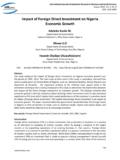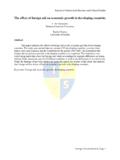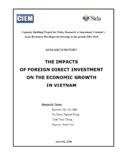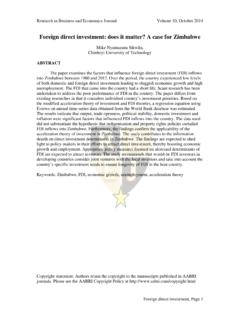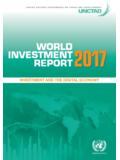Transcription of Foreign Direct Investment for Development - …
1 Foreign Direct Investment (FDI) is an integral part of an open and effectiveinternational economic system and a major catalyst to Development . Yet, thebenefits of FDI do not accrue automatically and evenly across countries, sectorsand local communities. National policies and the international investmentarchitecture play an important part in attracting FDI to a larger number ofdeveloping countries. It is the responsibility of the host countries to put in place atransparent, broad and enabling Investment policy environment and to reinforcethe human and institutional potentials necessary for such an environment. With most FDI flows originating in OECD countries, developed countries cancontribute to advancing this agenda. They can facilitate the access of developingcountries to international markets and technology, and ensure policy coherence fordevelopment more generally; encourage non-OECD countries to integrate furtherinto rules-based international frameworks for Investment ; actively promote theOECD Guidelines for Multinational Enterprises, together with other elements of theOECD Declaration on International Investment ; and share with non-members thepeer review-based approach to building Investment capacity.
2 The publication from which this Overview is taken provides a comprehensivereview of the issues related to the impact of FDI on Development covering aspectssuch as economic growth, technology transfer, human capital, competition,corporate governance and environment. It reviews the policies needed tomaximise the benefits. It is to be released in October DirectInvestment for Development MAXIMISING BENEFITS, MINIMISING Direct Investment for DevelopmentMAXIMISING BENEFITS, MINIMISING COSTS OECD's books, periodicals and statistical databases are now available via ,our online book is available to subscribers to the following SourceOECD themes:Finance and Investment /Insurance and PensionsDevelopmentAsk your librarian for more details of how to access OECD books onl ine, or write to us at OECD, 2002. Software: 1987-1996, Acrobat is a trademark of rights reserved.
3 OECD grants you the right to use one copy of this Program for your personal use reproduction, lending, hiring, transmission or distribution of any data or software isprohibited. You must treat the Program and associated materials and any elements thereof like any othercopyrighted requests should be made to:Head of Publications Service,OECD Publications Service,2, rue Andr -Pascal, 75775 Paris Cedex 16, Direct Investmentfor DevelopmentMAXIMISING BENEFITS, MINIMISING COSTSO verviewORGANISATION FOR ECONOMIC CO-OPERATION AND DEVELOPMENTxx xNote by the editorThis report was prepared within the framework of the activities of theCommittee on International Investment and Multinational Enterprises(CIME). It is based on a study by the OECD Secretariat, which wasreviewed by members and observers in the Committee at its meetings inDecember 2001 and April 2002.
4 The process included consultations withthe Business and Industry Advisory Committee, Trade Union AdvisoryCommittee and other civil society partners of the Committee. This reporthas been approved for publication by the Committee. 3 OECD 2002 IntroductionForeign Direct Investment (FDI) is an integral part of an open and effectiveinternational economic system and a major catalyst to Development . Yet, the ben-efits of FDI do not accrue automatically and evenly across countries, sectors andlocal communities. National policies and the international Investment architecturematter for attracting FDI to a larger number of developing countries and for reap-ing the full benefits of FDI for Development . The challenges primarily addresshost countries, which need to establish a transparent, broad and effectiveenabling policy environment for Investment and to build the human and institu-tional capacities to implement most FDI flows originating from OECD countries, developed countriescan contribute to advancing this agenda.
5 They can facilitate developing countries access to international markets and technology, and ensure policy coherence fordevelopment more generally; use overseas Development assistance (ODA) toleverage public/private Investment projects; encourage non-OECD countries tointegrate further into rules-based international frameworks for Investment ;actively promote the OECD Guidelines for Multinational Enterprises, togetherwith other elements of the OECD Declaration on International Investment ; andshare with non-members the OECD peer review-based approach to buildinginvestment capacity. 5 OECD 2002 Summary and ConclusionsThe present study focuses on maximisingthe benefitsof Foreign corporate countries, emerging economies and coun-tries in transition have come increasingly to see FDI as asource of economic Development and modernisation, incomegrowth and employment.
6 Countries have liberalised their FDIregimes and pursued other policies to attract have addressed the issue of how best to pursue domes-tic policies to maximise the benefits of Foreign presence in thedomestic economy. The study Foreign Direct Investment forDevelopment attempts primarily to shed light on the secondissue, by focusing on the overall effect of FDI on macro-economic growth and other welfare-enhancing processes, andon the channels through which these benefits take overall benefits of FDI for developing countryeconomies are well documented. Given the appropriatehost-country policies and a basic level of Development , apreponderance of studies shows that FDI triggers technol-ogy spillovers, assists human capital formation, contributesto international trade integration, helps create a more com-petitive business environment and enhances enterprisedevelopment.
7 All of these contribute to higher economicgrowth, which is the most potent tool for alleviating povertyin developing countries. Moreover, beyond the strictly eco-nomic benefits, FDI may help improve environmental andsocial conditions in the host country by, for example, trans-ferring cleaner technologies and leading to more sociallyresponsible corporate while also taking stock of the possible costs and proposing ways to reduce report does not focus solely on the positive effectsof FDI for Development . It also addresses concerns aboutpotential drawbacks for host economies, economic as wellas non-economic. While many of the drawbacks, referred toas costs in this report, arguably reflect shortcomings inForeign Direct Investment for Development : Overview 6 OECD 2002the domestic policies of host countries, important chal-lenges may nevertheless arise when these shortcomingscannot easily be addressed.
8 Potential drawbacks include adeterioration of the balance of payments as profits arerepatriated (albeit often offset by incoming FDI), a lack ofpositive linkages with local communities, the potentiallyharmful environmental impact of FDI, especially in theextractive and heavy industries, social disruptions of accel-erated commercialisation in less developed countries, andthe effects on competition in national markets. Moreover,some host country authorities perceive an increasingdependence on internationally operating enterprises asrepresenting a loss of political sovereignty. Even someexpected benefits may prove elusive if, for example, thehost economy, in its current state of economic develop-ment, is not able to take advantage of the technologies orknow-how transferred through hit new recordsin 1999 and magnitude of FDI flows continued to set recordsthrough the last decade, before falling back in 2000, world total inflows reached trillion US dollarsTable FDI outflows by region* Excluding OECD : OECD International Direct Investment USD millionPercentage of total19851990199520001985199019952000 WORLD61 277235 836335 1941 068 786100100100100of which: OECD countries42 055189 166263 716904 countries19 22246 67071 437137 which.
9 Africa4041953 1007 *2 17112 65025 10629 *84083 57014 America and Caribbean*9 10118 94823 63268 and Middle East2121 0561 9361 32513 41314 09317 and Conclusions 7 OECD 2002(USD) or four times the levels of five years earlier. Morethan 80% of the recipients of these inflows, and more than90% of the initiators of the outflows, were located in devel-oped countries . A breakdown of the outflows from OECD countries is provided in Table and although developed countries were the main recipients, developing countries also received economically significant limited share of FDI that goes to developing coun-tries is spread very unevenly, with two-thirds of total FDIflows from OECD members to non-OECD countries going toAsia and Latin America. Within regions there are somestrong concentrations on a few countries, such as China andSingapore in the case of Asia.
10 Even so, FDI inflows representsignificant sums for many developing countries, several ofthem recording levels of FDI, relative to the size of the domes-tic economy, that overshadow the largest OECD economies(Figure 1). Moreover, the flow of FDI to developing countriesworldwide currently overshadows official developmentassistance by a wide margin, further highlighting the needto address the use of FDI as a tool for economic develop-ment. The African continent s apparent problem withattracting FDI is briefly discussed in Box mainly in the form of greenfield recent years, an increasingly large share of FDI flowshas been through mergers and acquisitions (M&As). Thispartly reflects a flurry of transatlantic corporate takeovers,and partly the large-scale privatisation programmes thatFigure FDI stock, 2000 (share of GDP)Source: 5 10 15 20 25 30 35 Per centDeveloping countriesDeveloped countriesWorldAfricaLatin AmericaAsiaNorth AmericaWestern Europe0 5 10 15 20 25 30 35 Per centDeveloping countriesDeveloped countriesWorldAfricaLatin AmericaAsiaNorth AmericaWestern Europe0 5 10 15 20 25 30 35 Per centDeveloping countriesDeveloped countriesWorldAfricaLatin AmericaAsiaNorth AmericaWestern EuropeForeign Direct Investment for Development : Overview 8 OECD 2002 Box FDI in AfricaThe entire African continent (except South Africa) received FDI inflows worthan estimated US$ billion in 2000.











